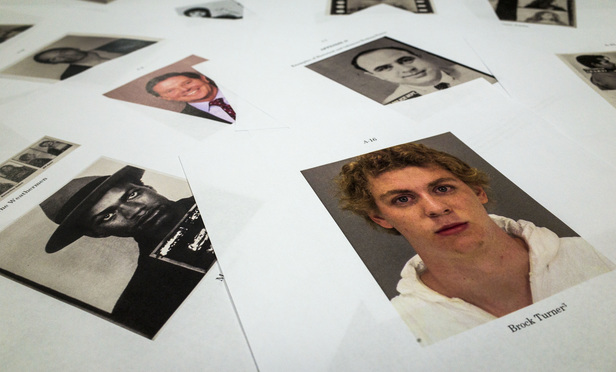Courtesy photos
Famed civil rights activists. Notorious gangsters and the Kennedy assassins. A former football star whose murder trial continues to transfix the country. An ex-Stanford swimmer whose six-month sentence for sexual assault drew nationwide attention.
As a whole, the group shares little in common. But this week, lawyers for some of the nation’s leading news organizations found a common thread connecting Rosa Parks and the Rev. Martin Luther King Jr. with the likes of John Dillinger and Al Capone, Lee Harvey Oswald and Sirhan Sirhan, O.J. Simpson and Brock Turner.
Each was arrested—a shared experience memorialized in a mug shot—at least once.
In an amicus brief filed Wednesday in the U.S. Supreme Court, these booking photographs were juxtaposed to prove a point: That the images have a historical value, building an understanding of the context behind arrests, and should be widely available to the public.
The Reporters Committee for Freedom of Press and 28 media organizations filed the brief in support of the Detroit Free Press, which sued for public access to the mug shots of four Michigan police officers booked on federal bribery and drug conspiracy charges. The Detroit paper, represented by Orrick, Herrington & Sutcliffe, is fighting to revive its public-records case.
Covington & Burling; Baker & Hostetler; Davis Wright Tremaine; Holland & Knight; Weil, Gotshal & Manges; and Wiley Rein were among the law firms identified on the brief as counsel for the media organizations.
“The significant value to the public of access to booking photographs is underscored by the role that they have played in informing our understanding of important historical events,” the Reporters Committee said in the amicus brief. “Many booking photos have come to symbolize critical moments in American history.”
The Reporters Committee argued in its brief:
The public’s interest in access to these photos is not voyeuristic, but is rather an interest in understanding the broader social context behind the arrest such photos serve to record. For example, the booking photograph of civil rights icon Rosa Parks depicts dignity and resolve in the face of a government enforced system of racial segregation. Her image conveys a powerful commitment to her act of civil disobedience, in addition to serving as an official record of the fact that she was arrested.
This content has been archived. It is available through our partners, LexisNexis® and Bloomberg Law.
To view this content, please continue to their sites.
Not a Lexis Subscriber?
Subscribe Now
Not a Bloomberg Law Subscriber?
Subscribe Now
LexisNexis® and Bloomberg Law are third party online distributors of the broad collection of current and archived versions of ALM's legal news publications. LexisNexis® and Bloomberg Law customers are able to access and use ALM's content, including content from the National Law Journal, The American Lawyer, Legaltech News, The New York Law Journal, and Corporate Counsel, as well as other sources of legal information.
For questions call 1-877-256-2472 or contact us at [email protected]






